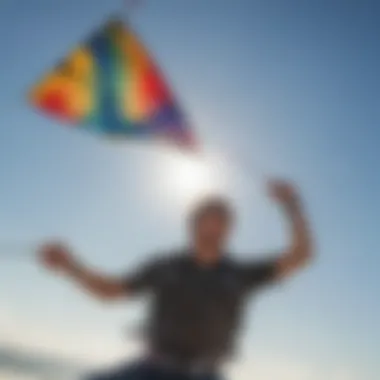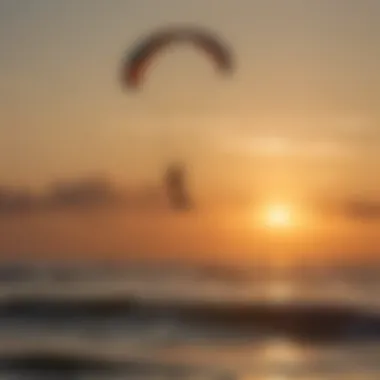Unveiling the Thrilling World of Outer Banks Kite Surfing: A Fusion of Nature's Elements and Extreme Sports


Safety Guidelines
While kite surfing promises adrenaline-pumping thrills, safety should always remain a top priority to ensure a secure and enjoyable experience on the water. Understanding how weather conditions impact kite surfing safety is imperative, as wind speed, currents, tides, and atmospheric changes can pose challenges to even the most seasoned riders. By monitoring weather forecasts, assessing local conditions, and staying vigilant on the water, kite surfers can mitigate risks and make informed decisions to safeguard themselves and others. In the event of emergencies, having thorough knowledge of rescue tactics, emergency protocols, and first aid procedures is essential for handling accidents and mishaps swiftly and effectively. Regular equipment maintenance, including checks, repairs, and replacements, is paramount to sustaining gear integrity and upholding safety standards for every kite surfing excursion. By prioritizing safety awareness, preparedness, and diligence, kite surfers can revel in the heart-stopping thrills of the sport while ensuring their well-being and enjoyment remain uncompromised.
Introduction to Outer Banks Kite Surfing
Kite surfing in the Outer Banks unfolds an opportunity for enthusiasts to immerse themselves in the exhilarating fusion of wind, waves, and adrenaline. As we embark on this thrilling journey through the world of kite surfing, we delve into a realm where nature's forces collide, and individuals harness the power of the elements. The introduction sets the stage for an exploration into the heart-pounding experiences, techniques, and top destinations that await kite surfers in the Outer Banks.
History and Evolution
The history and evolution of kite surfing in Outer Banks trace back to its inception as a niche water sport that has now evolved into a global phenomenon. From its humble beginnings as a recreational activity to its current status as an adrenaline-pumping extreme sport, kite surfing has undergone significant transformations over the years. Understanding the historical context and evolution of kite surfing provides enthusiasts with valuable insights into the sport's progression and the innovation that drives it forward.
Unique Characteristics of Outer Banks
The Outer Banks stand out as a unique and sought-after destination for kite surfers due to its distinctive blend of natural features and atmospheric conditions. With its vast expanses of open water, consistent winds, and diverse topography, the Outer Banks offer an unparalleled playground for kite surfing enthusiasts. Exploring the unique characteristics of the Outer Banks sheds light on why this region has become a mecca for thrill-seekers and extreme sport aficionados. From the dynamic interplay of wind patterns to the stunning ocean views, the Outer Banks provide a one-of-a-kind backdrop for unforgettable kite surfing experiences.
Essential Equipment for Kite Surfing
In the thrilling realm of kite surfing in Outer Banks, having the right equipment is paramount for a safe and exhilarating experience. The essential equipment comprises the kitesurfing kite, board and harness, as well as safety gear. Each component plays a vital role in ensuring successful rides amidst the wind and waves.


Kitesurfing Kite
Types of Kites
Types of kites are a crucial consideration for kite surfing enthusiasts. Among the various types available, the leading options are foils and inflatables. Foil kites offer excellent performance in light winds due to their efficient aerodynamics. On the other hand, inflatable kites are more user-friendly and simple to relaunch from the water. Understanding the differences between these types allows riders to select the most suitable option based on wind conditions and skill level.
Choosing the Right Size
Selecting the appropriate kite size is fundamental for a successful kite surfing session. The kite size directly influences power delivery and control. Larger kites generate more power, ideal for light wind conditions, while smaller kites provide greater maneuverability in stronger winds. Riders must consider factors such as wind speed, rider weight, and board size when choosing the right kite size to match the prevailing conditions, ensuring a balanced and enjoyable experience.
Board and Harness
Safety Gear
Helmets
Impact Vests
Emergency Whistles
Mastering Kite Control and Techniques


Kite surfing in the Outer Banks demands a profound understanding of kite control and techniques. Mastery in this area is not just beneficial; it’s crucial for a safe and exhilarating experience on the waves. The ability to manipulate the kite with precision, adjust to changing wind conditions, and execute advanced maneuvers all stem from a solid grasp of kite control. Techniques such as power strokes, depower methods, and steering skills play a pivotal role in navigating the kite through diverse wind windows and harnessing its power effectively. Without mastering these fundamentals, kite surfers risk endangering themselves and others on the water. Therefore, honing kite control and techniques is a non-negotiable aspect of the kite surfing journey in the Outer Banks.
Launching and Landing
Launching and landing the kite are fundamental components of a successful kite surfing session. When done correctly, these maneuvers ensure a smooth start and finish to your thrilling ride. Launching involves inflating the kite, positioning it correctly for wind capture, and guiding it skyward with finesse. Understanding wind direction and strength is vital during this phase to prevent mishaps. Landing, on the other hand, requires strategic control to bring the kite down gently and dismantle it safely. Anticipating environmental factors and reacting promptly are key to executing flawless launches and landings. By mastering these essential skills, kite surfers can enhance their safety and enjoyment on the water.
Wind Window Understanding
An in-depth comprehension of the wind window is indispensable for kite surfers aiming to maneuver their kites with finesse and efficiency. The wind window represents the imagined area in the sky where the kite can fly, determined by the kite's position relative to the surfer. Divided into three distinct zones - the power zone, the edge of the window, and the neutral zone - the wind window influences the kite's behavior and power output. Kite surfers must grasp how wind speed and direction impact the kite within these regions to optimize control and performance. By leveraging wind window understanding, riders can harness the wind's energy effectively and execute seamless transitions and tricks with confidence.
Body Dragging
Body dragging is a valuable skill that allows kite surfers to navigate water surfaces without the need for a board. Serving as both a safety technique and a training exercise, body dragging refines control over the kite and enhances water awareness. By adjusting body position and kite angles, surfers can propel themselves in various directions and retrieve lost equipment efficiently. This technique is particularly useful in scenarios where board recovery or relocation is necessary. Mastering body dragging not only boosts overall kite control but also cultivates adaptability and resourcefulness in challenging aquatic environments.
Waterstart Techniques
Waterstart techniques are pivotal for kite surfers looking to transition from body dragging to riding with a board. This process involves positioning the kite correctly, utilizing body momentum, and engaging in a controlled board start on the water's surface. Balancing power delivery and board control during the waterstart is essential for achieving a smooth and graceful ride. Factors such as wind strength, board position, and rider's weight distribution significantly influence the success of waterstarting. By honing these techniques, kite surfers can seamlessly transition from surface activities to full-fledged rides, unlocking a new realm of excitement and mastery in the sport.
Exploring the Best Kite Surfing Spots in Outer Banks
The section 'Exploring the Best Kite Surfing Spots in Outer Banks' within the article serves as a pivotal segment, shedding light on the crucial aspect of location selection for kite surfers. This part is integral as it directs enthusiasts towards the prime spots where wind conditions align ideally with the geography, offering a remarkable kite surfing experience. Understanding the significance of location in kite surfing is key to maximizing enjoyment and safety throughout the adventure.


Cape Hatteras National Seashore
Cape Hatteras National Seashore stands out as a gem among the kite surfing spots in Outer Banks. With expansive sandy beaches and consistent strong winds, it has become a go-to destination for kite surfers seeking perfect conditions. The strategic positioning of Cape Hatteras allows for wind directions that complement the coastline, creating an exhilarating environment for both beginners and advanced riders. Its natural beauty adds to the allure, providing a picturesque backdrop to the adrenaline-fueled sport.
Rodanthe
Rodanthe emerges as another top-tier kite surfing spot in Outer Banks, known for its dynamic conditions and diverse kite surfing opportunities. The location's unique geographic features, such as sandbars and inlets, contribute to creating varied experiences for riders of all levels. Whether you prefer wave riding or flat water sessions, Rodanthe offers a blend of challenges and thrills that cater to different preferences. The community's kite surfing culture further enhances the overall ambiance, making it a hotspot for enthusiasts seeking a vibrant and dynamic environment.
Pamlico Sound
Pamlico Sound holds its own allure as a prime kite surfing destination within the Outer Banks region. The shallow waters of Pamlico Sound provide an excellent learning ground for beginners, offering a safe and spacious area to hone skills and build confidence on the board. Additionally, the consistent thermal winds across Pamlico Sound create optimal conditions for long sessions and progression in kite control. As such, Pamlico Sound serves as a training ground and playground for kite surfers looking to refine their techniques and push their limits in a controlled environment.
Safety Precautions and Best Practices
Kite surfing in the Outer Banks is an exhilarating experience, but safety should always be a top priority for every kitesurfer. Understanding and implementing proper safety precautions and best practices not only enhance the enjoyment of the sport but also ensure the well-being of oneself and others. Various elements contribute to a safe and successful kite surfing session in the Outer Banks, from monitoring weather conditions to respecting right of way and being well-versed in emergency procedures. Prioritizing safety precautions and best practices is essential for a thrilling yet secure kite surfing adventure.
Weather Monitoring
Weather monitoring is a crucial aspect of kite surfing in the Outer Banks. Being aware of changing weather patterns, wind speeds, and potential storms is vital for the safety of kitesurfers. Sudden shifts in weather can impact the dynamics of kite surfing, posing risks to both the surfer and others in the vicinity. By staying informed about weather forecasts, kitesurfers can plan their sessions effectively, choosing the right time and conditions to ensure a smooth and safe experience on the water.
Respecting Right of Way
Respecting the right of way is a fundamental principle in kite surfing etiquette that plays a pivotal role in ensuring the safety of all individuals involved. Understanding and adhering to right of way rules prevent collisions, accidents, and conflicts among kitesurfers sharing the same water space. By following established guidelines and yielding to others as needed, kitesurfers demonstrate respect, courtesy, and consideration for fellow enthusiasts, creating a harmonious environment conducive to enjoyable and risk-free kite surfing sessions.
Emergency Procedures
In the unpredictable realm of kite surfing, being well-prepared to handle emergencies is imperative. Knowledge of emergency procedures, such as self-rescue techniques, signaling for help, and assisting others in distress, can make a significant difference in critical situations. Quick thinking, calm execution, and swift action are essential components of effective emergency responses in kite surfing. By familiarizing themselves with emergency protocols and staying alert at all times, kitesurfers can mitigate risks and ensure the safety of themselves and their peers.







